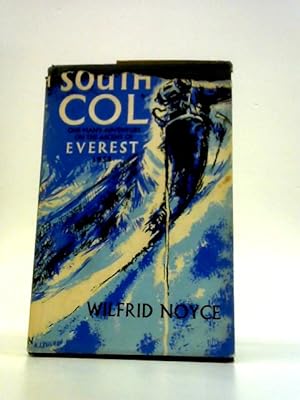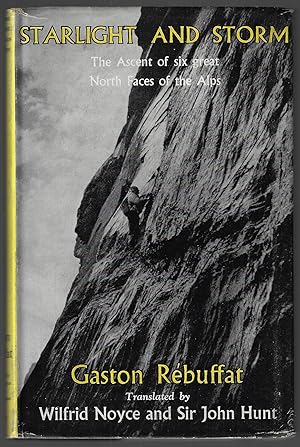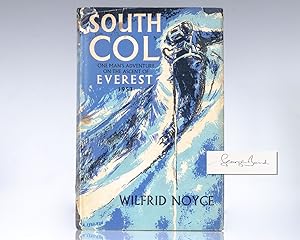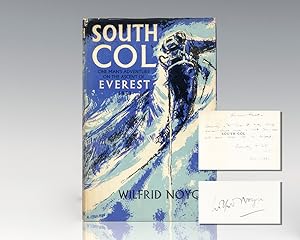Wilfrid Noyce Sir John Hunt (9 results)
Product Type
- All Product Types
- Books (9)
- Magazines & Periodicals
- Comics
- Sheet Music
- Art, Prints & Posters
- Photographs
- Maps
-
Manuscripts &
Paper Collectibles
Condition
- All Conditions
- New
- Used
Binding
- All Bindings
- Hardcover (8)
- Softcover
Collectible Attributes
- First Edition (6)
- Signed (2)
- Dust Jacket (5)
- Seller-Supplied Images (4)
- Not Printed On Demand
Seller Location
Seller Rating
-
South Col One Man's Adventure on the Ascent of Everest, 1953
Published by William Heinemann, 1954
Seller: World of Rare Books, Goring-by-Sea, SXW, United Kingdom
First Edition
Condition: Very Good. 1954. First Edition. 303 pages. Pictorial dust jacket over blue cloth. Black and white photographic plates throughout. Binding is slightly shaky, pages slightly loose. Pages and plates have light tanning and foxing throughout. Pencil inscription to title page. Boards have light shelf-wear with corner bumping. Light sunning to spine and edges with crushing to spine ends. Wear marks overall. Unclipped jacket has heavy edgewear with areas of loss, heavy tears, chips, and creasing. Light tanning to spine and edges. Wear marks and foxing overall.
-
SOUTH COL : One Man's Adventure on the Ascent of Everest, 1953
Published by William Heinemann, Melbourne, Australia, 1954
Seller: 100POCKETS, Berkeley, CA, U.S.A.
First Edition
Hard Cover. Condition: Good. No Jacket. A.J. Veilhan (Line Drawings & End-Papers) (illustrator). First Edition, First Thus. Text/Bright & clean w/open hinge to pg 108. Blue linen boards/VG w/short lesions to lower spine edge, and showing discoloration to spine & surface. No Jacket. Upper text edge dyed blue. Memoir of Wilfrid Noyce, team member of the 1953 9th British Expedition, lead by Sir John Hunt (Foreword), in which Sir Edmund Hillary and Tenzing scale Everest. This is the memoir of Wilfrid Noyce in scaling South Col which lies between Mount Everest and Lhotse, the first and fourth highest mountains in the world. It is a final stepping stone for climbers approaching Everest from the southeast ridge in Nepal. Wilfrid Noyce and the Sherpa Annullu were the first climbers on the expedition to reach the Col. Sir John Hunt recorded: "It was 2.40 p.m. Wilfrid Noyce and his companion Annullu stood at that moment above the South Col of Everest, at about 26,000 feet. .they were . looking upwards to the final pyramid of Everest itself. It was a great moment . shared by all of us who watched it. Their presence there was symbolic of our success in overcoming the most crucial problem of the whole climb; they had reached an objective which we had been striving to attain for twelve anxious days." Strong copy.
-
South Col
Published by The Reprint Society 1955, 1955
Seller: Hard to Find Books NZ (Internet) Ltd., Dunedin, OTAGO, New Zealand
Association Member: IOBA
Octavo hardcover (VG) in d/w (G+) jacket scruffy; all our specials have minimal description to keep listing them viable. They are at least reading copies, complete and in reasonable condition, but usually secondhand; frequently they are superior examples. Ordering more than one book may reduce your overall postage costs.
-
South Col A Personal Story of the Ascent of Everest
Published by William Heinemann, 1954
Seller: Books From California, Simi Valley, CA, U.S.A.
hardcover. Condition: Good.
-
South Col A Personal Story of the Ascent of Everest
Published by William Heinemann
Seller: ThriftBooks-Atlanta, AUSTELL, GA, U.S.A.
Hardcover. Condition: Fair. No Jacket. Readable copy. Pages may have considerable notes/highlighting. ~ ThriftBooks: Read More, Spend Less 1.65.
-
Condition: Fair. First edition copy. . Book Good. No dust jacket. Owner's name on half title page. (Mountaineering, Mount Everest).
-
Starlight and Storm, The Ascent of Six Great North Faces of the Alps
Published by J.M. Dent, London, 1956
First Edition
Hardcover. Condition: Near fine. Dust Jacket Condition: near fine. First Edition. 122 pp, indexed, illustrated with maps and diagrams and 37 pages of plates. Near fine copy in original blue cloth with slight bumping to corners. Dust jacket lightly rubbed. Translated from the 1954 French original. Neate R20: "Accounts of his own ascents; expressive and lyrical." The ascents included the Eiger, Grandes Jorasses, Piz Badile, Matterhorn, Drus, Cima Grande di Lavaredo.
-
South Col: One Man's Adventure on the Ascent of Everest, 1953.
Published by William Heinemann Ltd, London, 1954
Seller: Raptis Rare Books, Palm Beach, FL, U.S.A.
First Edition Signed
First edition of Noyce's firsthand account of the ascent of South Col. Octavo, original cloth, pictorial endpapers, illustrated with photogravures and maps including frontispiece. Foreword by Sir John Hunt. Signed by 1953 Mount Everest British expedition member George Band on the title page. George Christopher Band George was the youngest climber on the 1953 British expedition to Mount Everest. From the library of mountaineer and author Richard Sale with his signed bookplate opposite the title page. Very good in a good dust jacket. On May 21, 1953 Noyce and the Sherpa Annullu (the younger brother of Da Tensing) were the first members of the expedition to reach Everest's South Col, after what Noyce said was "one of the most enjoyable days' mountaineering I've ever had". They left Camp VII at 9.30 am, both using oxygen; according to Noyce, "I had told Anullu that we would not start too early, for fear of frostbite." Several hours later they reached the highest point attained by the British expedition to date: "an aluminium piton with a great coil of thick rope" left by George Lowe and party. The climbers in the camps below, according to Hunt, were watching their progress on this vital part of the climb; by early afternoon "their speed had noticeably increased and our excitement soon grew to amazement when it dawned on us that Noyce and Annullu were heading for the South Col itself". Not long after Hunt made that observation, they reached the Col. It was 2.40 p.m. Wilfrid Noyce and his companion Annullu stood at that moment above the South Col of Everest, at about 26,000 feet. They were gazing down on the scene of the Swiss drama, and they were also looking upwards to the final pyramid of Everest itself. It was a great moment for them both, and it was shared by all of us who watched it. Their presence there was symbolic of our success in overcoming the most crucial problem of the whole climb; they had reached an objective which we had been striving to attain for twelve anxious days. In a passage in South Col, Noyce's book of the expedition published the following year, he gives an account of the scene that greeted him at the Col: "We were on a summit, overlooked in this whole scene only by Lhotse and Everest. And this was the scene long dreamed, long hoped for. To the right and above, the crenellations of Lhotse cut a blue sky fringed with snow cloudlets. To the left, snow mist still held Everest mysteriously. But the eye wandered hungry and fascinated over the plateau between; a space of boulders and bare ice perhaps four hundred yards square, absurdly solid and comforting at first glance in contrast with the sweeping ridges around, or the blank mist that masked the Tibetan hills beyond. But across it a noisy little wind moaned its warning that the South Col, goal of so many days' ambition, was not comfortable at all. And in among the glinting ice and dirty grey boulders there lay some yellow tatters â " all that remained of the Swiss expedition of last year.".
-
South Col: One Man's Adventure on the Ascent of Everest 1953.
Published by William Heinemann Ltd, London, 1954
Seller: Raptis Rare Books, Palm Beach, FL, U.S.A.
First Edition Signed
First edition of Noyce's firsthand account of the ascent of South Col. Octavo, original cloth, pictorial endpapers, illustrated with photogravures and maps including frontispiece. Foreword by Sir John Hunt. Association copy, signed by Noyce on the title page and inscribed by him on the front free endpaper to Susan Hunt, "Susan Hunt, Specially - We hope it may while some hours away & that you are not tired with the subject. Rosemary & Wilf Jan 1955." The recipient, Susan Hunt, was the daughter of Sir John Hunt, the leader of the first expedition to reach the summit of Mount Everest in 1953. Susan Hunt married New Zealand-born mountaineer George Lowe, a member of the 1953 expedition, in 1962. During the expedition, Lowe prepared the route from the head of the Western Cwm up the Lhotse Face towards the South Col. He was a member of the support party for Edmund Hillary and Tenzig Norgay's summit attempt and the day before the successful summit, with Alfred Gregory and Sherpa Ang Nyima, descended to the South Col to await Hillary and Norgay's descent. Upon their meeting, Hillary delivered his infamous greeting: "Well, George, we knocked the bastard off." With Lowe's bookplate to the pastedown. Near fine in a very good dust jacket. An exceptional association copy. On May 21, 1953 Noyce and the Sherpa Annullu (the younger brother of Da Tensing) were the first members of the expedition to reach Everest's South Col, after what Noyce said was "one of the most enjoyable days' mountaineering I've ever had". They left Camp VII at 9.30 am, both using oxygen; according to Noyce, "I had told Anullu that we would not start too early, for fear of frostbite." Several hours later they reached the highest point attained by the British expedition to date: "an aluminium piton with a great coil of thick rope" left by George Lowe and party. The climbers in the camps below, according to Hunt, were watching their progress on this vital part of the climb; by early afternoon "their speed had noticeably increased and our excitement soon grew to amazement when it dawned on us that Noyce and Annullu were heading for the South Col itself". Not long after Hunt made that observation, they reached the Col. It was 2.40 p.m. Wilfrid Noyce and his companion Annullu stood at that moment above the South Col of Everest, at about 26,000 feet. They were gazing down on the scene of the Swiss drama, and they were also looking upwards to the final pyramid of Everest itself. It was a great moment for them both, and it was shared by all of us who watched it. Their presence there was symbolic of our success in overcoming the most crucial problem of the whole climb; they had reached an objective which we had been striving to attain for twelve anxious days. In a passage in South Col, Noyce's book of the expedition published the following year, he gives an account of the scene that greeted him at the Col: "We were on a summit, overlooked in this whole scene only by Lhotse and Everest. And this was the scene long dreamed, long hoped for. To the right and above, the crenellations of Lhotse cut a blue sky fringed with snow cloudlets. To the left, snow mist still held Everest mysteriously. But the eye wandered hungry and fascinated over the plateau between; a space of boulders and bare ice perhaps four hundred yards square, absurdly solid and comforting at first glance in contrast with the sweeping ridges around, or the blank mist that masked the Tibetan hills beyond. But across it a noisy little wind moaned its warning that the South Col, goal of so many days' ambition, was not comfortable at all. And in among the glinting ice and dirty grey boulders there lay some yellow tatters â " all that remained of the Swiss expedition of last year.".






